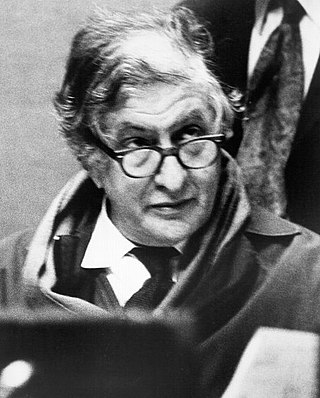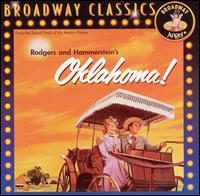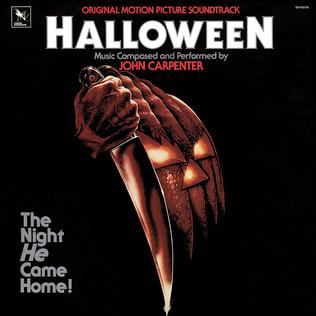
Bernard Herrmann was an American composer and conductor best known for his work in composing for films. As a conductor, he championed the music of lesser-known composers. He is widely regarded as one of the greatest film composers.

The Trouble with Harry is a 1955 American Technicolor black comedy film directed by Alfred Hitchcock. The screenplay by John Michael Hayes was based on the 1950 novel by Jack Trevor Story. It starred Edmund Gwenn, John Forsythe, Mildred Natwick, Jerry Mathers and Shirley MacLaine in her film debut. The Trouble with Harry was released in the United States on September 30, 1955, then re-released in 1984 once the distribution rights had been acquired by Universal Pictures.
Varèse Sarabande is an American record label, owned by Concord Music Group and distributed by Universal Music Group, which specializes in film scores and original cast recordings. It aims to reissue rare or unavailable albums, as well as newer releases by artists no longer under a contract. The label's name was derived from combining French-born composer Edgard Varèse's last name with the musical term sarabande, a slow Spanish dance.
The various film and theatre appearances of the Superman character have been accompanied by musical scores.
The National Philharmonic Orchestra was a British orchestra created exclusively for recording purposes. It was founded by RCA Records producer and conductor Charles Gerhardt and orchestra leader and contractor Sidney Sax. The orchestra was created partly due to the requirements of an extensive recording project for the Reader's Digest.
The 2001: A Space Odyssey score is an unused film score composed by Alex North for Stanley Kubrick's 1968 film, 2001: A Space Odyssey.
Joel McNeely is an American composer, arranger, musician, lyricist, and record producer. A protégé of composer Jerry Goldsmith, he is best known for his film and television scores. He won the Primetime Emmy Award for Outstanding Music Composition for a Series for his work on The Young Indiana Jones Chronicles. He frequently collaborates with Seth MacFarlane and contributes to various projects by The Walt Disney Company.
Charles Allan Gerhardt was an American conductor, record producer, and arranger.
The Hollywood Symphony Orchestra (HSO) is a large scale American symphony orchestra based in Los Angeles, California. Its founder was John Scott and its current Principal Conductor and consulting producer is John Everett Beal. The HSO is dedicated to performing classic, contemporary and world premiere media scores, and comprises recording musicians from the Hollywood movie studios and the Los Angeles concert scene.

Oklahoma! is the original soundtrack album of the 1955 film Oklahoma!, an adaptation of the musical Broadway play of the same name. The soundtrack charted No. 1 on the Billboard Pop Album Chart in 1956 and has been in continual print. On July 8, 1958, it became the first album to be certified "gold" by the RIAA, and was later certified "2x multi-platinum" on April 1, 1992.

Cleopatra: Original Soundtrack Album is the soundtrack from the film of the same name, released by 20th Century Fox Records in 1963. The music of Cleopatra was composed and conducted by Alex North, and was recorded and produced in 1963.

Halloween is a soundtrack album composed and performed by John Carpenter, featuring the score to the 1978 film Halloween. It was released in Japan in 1979 through Columbia Records and in the US in 1983 through Varèse Sarabande. An expanded 20th Anniversary Edition was released in 1998 through Varèse Sarabande. In 2018, an LP was released by Mondo Records featuring the mono tracks taken from the original 35mm stem of the film and for the first time features the music as originally heard in theaters and on the earliest VHS releases of the film. The soundtrack would later play a major role in influencing the synthwave music genre.

Alien: Original Motion Picture Soundtrack The iconic, avant-garde score to the film Alien was composed by Jerry Goldsmith and is considered by some to be one of his best, most visceral scores. Rather than focusing on themes, Goldsmith creates a bleak and dissonant soundscape that fits the film's dark and intense atmosphere, with only a few "romantic" cues.

Star Trek: Music from the Motion Picture is a soundtrack album for the 2009 film Star Trek, composed by Michael Giacchino. The score was recorded in October 2008 since the film was originally scheduled to be released the following December. It was performed by the Hollywood Studio Symphony and Page LA Studio Voices at the Sony Scoring Stage in Culver City, California. The score incorporates the "Theme from Star Trek" by Alexander Courage and Gene Roddenberry.

Videodrome is the official soundtrack album of the 1983 Canadian science fiction horror film Videodrome. While the film's score was composed by Howard Shore, a close friend of the Director David Cronenberg, the album was remixed for individual release by the record label Varèse Sarabande. The new mix was done by Scot Holton who chose to emphasize many of the elements of the score differently from in the original film.

Star Trek: Nemesis – Music from the Original Motion Picture Soundtrack is a soundtrack album for the 2002 film, Star Trek: Nemesis, composed by Jerry Goldsmith. Released on December 10, 2002 through Varèse Sarabande, the soundtrack features fourteen tracks of score at a running time just over forty-eight minutes, though bootleg versions containing the entire score have since been released. A deluxe edition soundtrack limited to 5000 copies was released on January 6, 2014 by Varèse Sarabande.
Mad Max 2: Original Motion Picture Soundtrack is a soundtrack album for the 1981 film, Mad Max 2, composed by Brian May. It was released on vinyl in the United States in 1982 by Varèse Sarabande, followed by a CD release on 25 October 1990.
Varèse Sarabande is an American record label that is owned by Concord Music, which specializes in film scores and original cast recordings.
The Iron Giant is the 1999 animated science fiction film directed by Brad Bird for Warner Bros. Feature Animation. The film featured original score composed by Michael Kamen, in his first and only collaboration with Bird, as all his future films were scored by Michael Giacchino beginning with The Incredibles (2004). The score featured additional performance from the Czech Philharmonic symphony orchestra at Prague, conducted by Kamen himself and recording of the score happened within one week.
Die Hard: Original Motion Picture Soundtrack is the soundtrack for John McTiernan's 1988 action film Die Hard starring Bruce Willis, that features an original score composed by Michael Kamen and incorporates diegetic music pieces. It has been critically acclaimed and assessed as one of Kamen's best works in film music and won him a BMI TV/Film Music Award for his work on the score.









